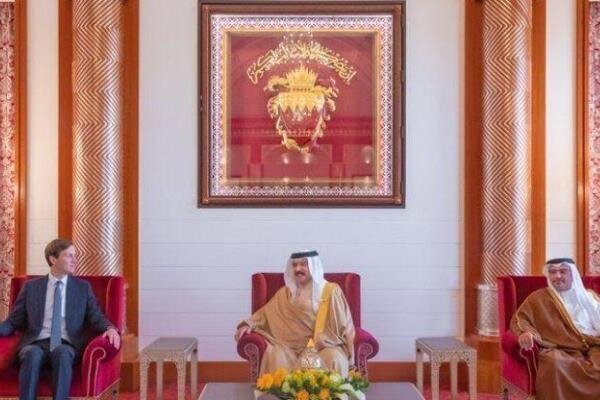Bahrain’s normalization deal: mission of godfather’s pawns

TEHRAN – Saudi Arabia, the godfather, has sent off its insignificant pawns to play the chess game of "normalization of relations with Israel" first to test the waters for its own normalization of relations with the regime.
The “train of normalization”, or more precisely, the recognition of the process of normalization of relations with the Zionist regime, has finally arrived at the Bahraini station, as was already expected.
Of course, Bahrain had already stepped onto this path ahead of other Arab countries, at a time when the first step was taken to implement the so-called “Deal of the Century” in this country. The holding of the economic summit of the Deal of the Century in Bahrain, which took place months ago, showed that Bahrain is certainly acting no differently from its other Arab friends in the Persian Gulf while walking on this path.
The important point here is to interpret the reason for choosing the UAE and Bahrain as the first countries to normalize relations with the Zionist regime within the framework of the constituent structure of these countries and the Arab dictators’ dependency on the Zionist regime; dictatorial regimes that see their stability and the survival of their political life in giving concessions to the Zionist regime, and some of them have been formed on the basis of a British or American agreement. Some of these dictatorial regimes also lack political independence and popular support.
Bahrain, meanwhile, can be described as a degrading political model and dependent on Saudi Arabia, lacking national independence and popular support, and aptly fit for the term "Saudi Arabia’s errand boy".
Most countries, which are called small or microscopic countries in international relations, are either formed on the basis of political agreements and seek an opportunity to maintain their power or even eliminate political rivals at home, or in the absence of these elements, they seek to side with and support the policies of the United States and the Zionist regime in the regional and global arenas.

As noted earlier, the power and influence of these countries to sway the public opinion of the Arab nations are not enough for them to play a prominent role for the Palestinian cause, and that is exactly why Israel and Trump have chosen them to act as the first stops for the train of the normalization of relations with the regime. On the one hand, due to the lack of national capacity and commonalities, and home to a heterogeneous population, they are not worried about popular reactions in these countries, and on the other hand, it can be a good benchmark for measuring the reaction of other Islamic and Arab nations to this dangerous and threatening move.
Foreigners make up a large part of the UAE population. On the other hand, these countries are not of special strategic importance in terms of historical and cultural impact on the Palestinian cause. Instead, these countries pick up and carry out missions that the US has pre-defined for them.

However, it should be emphasized that Trump, in addition to using the normalization of relations with the Zionist regime for his own electoral campaign, feels that if he succeeds with the UAE and the islands, then the way to normalize relations with Israel would be paved for other countries, or at least the costs of such a measure would be reduced.
Of course, they are still waiting for the reaction of the Arab and Islamic nations. This is where the support of Egyptian President Abdel Fattah al-Sisi and some Arab kings come into the picture. It is clear that the next stop - if their evaluations get the desired results - will be some key Arab countries that play an important role in the Palestinian political arena.
In general, it can be said that Saudi Arabia has sent off its insignificant pawns and errand boys to play in this game of chess, in order to, if the conditions are right, make public its own normalization of relations with Israel. This issue has been raised even with the Egyptians.
Undoubtedly, this American political show is only for electoral purposes and can be evaluated in line with the implementation of projects such as the deal of the century, the annexation of the West Bank and parts of the occupied Golan, the relocation of the US embassy from Tel Aviv to Jerusalem al-Quds, and now the Arab countries’ normalization of relations with the Zionist regime.
In any case, what happened in actuality was that all Palestinian factions, with all their various suffixes, methods of resistance, approaches, and different tastes, achieved a common ground, with results that may not have been so easy to obtain over the years.
It should be noted that Arab ethnicity or mere Arabism, without invoking Islamic teachings and the option of resistance, not only cannot bring the Palestinian people closer to its aspirations but rather putting trust in the camp over the years, i.e. the process of reconciliation has reduced the level of demands of the Palestinian people from the formation of an independent Palestinian state to the withdrawal of settlements in the Palestinian territories.
